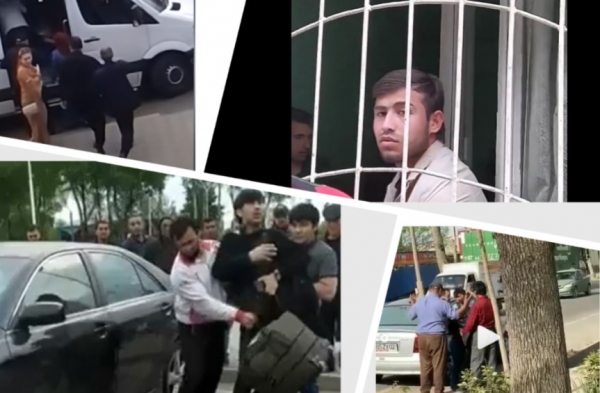It will be prohibited from reporting on ‘oblava (raid) and situation in the army in Tajikistan
Tajik authorities have penalized “dissemination of false information about the army.”
The Ministry of Defense (MoD) had proposed to impose penalty upon for publication and dissemination of false information about the army and conscription process, including videos about so-called ‘oblava’ (raid - forced military recruitment of young men).
An official source at a MoD has confirmed this information and noted that a draft amendment on this subject was submitted for consideration to the parliament.
“The main objective of this draft amendment is to prevent discrediting of service in the Tajik army,” said the source. “Dissemination of any false information among the population weakens people's confidence in the army and negatively affects the prestige and defense capability of the country.”
According to him, the draft amendment aims to prevent dissemination any false information about service in the Tajik army and conscription process “through mass media, including Internet and other electronic communications networks.”
The source further added that while developing the draft amendment, they had studied experience of other countries and “at the initial stage, the dissemination of false information about the army will be punishable by a fine or an administrative arrest.”
During two months in spring (April-May and two months in autumn (October-November), videos showing Tajik men of serving age being hauled off streets or taken from their homes and forced into cars by plainclothes law enforcement have been appearing on social media networks.
The two-month-long effort seeking to enlist young men aged 18-27 for the one- or two-year compulsory military service takes place twice a year, in the spring and in the autumn.
Legal changes that went into effect last year have reduced the scope for dodging military service and boosted the army’s capacity to shape the seasonal call ups.
Men aged between 18 and 27 and deemed healthy must now either accept a grim two- or one-year stint in the armed services or pay a hefty sum to take a month-long course in military preparedness instead.
To take the paid one-month basic reserve service, Tajik young men must pay an amount equivalent to 450 calculating indicators (estimate). This year, the calculating indicator has been set at 64.00 somonis.
Young Tajiks can avoid or postpone military service if they are ill, studying at university, an only son, or if they have two children.
Some sources say the conscription target for 2022 had grown by a quarter compared to last year to reach 20,000, while usual annual conscription target in Tajikistan, according to the Ministry of Defense, is some 15,000-16,000.
Tajikistan’s armed forces consist of Ground Forces, Mobile Forces (paratroopers of the armed forces of Tajikistan), Air Force and Air Defense Force.
According to some sources, the authorities have put pressure on hundreds of university students to enlist in the national army and even threatened them with expulsion if they refuse. It has come as the military's spring call-up is under way in the country, where many young men try to avoid going into the army. The Tajik government insists that students have joined the military on their own accord. Education officials say summer exams have moved forward for the hundreds of students who are leaving for the one year of service.
To fulfill conscription campaign, the Tajik authorities sometimes still use military recruitment raids. A ‘hunt’ for persons of draft age, more commonly known as ‘raid’, which is sometimes used to catch young people, is a violation of the law. The Tajik authorities do not admit the use of raids, but ordinary citizens and analysts repeatedly expressed concern about the forced recruitment of young people, and other illegal methods used in recruiting campaigns.

Комментарии (0)